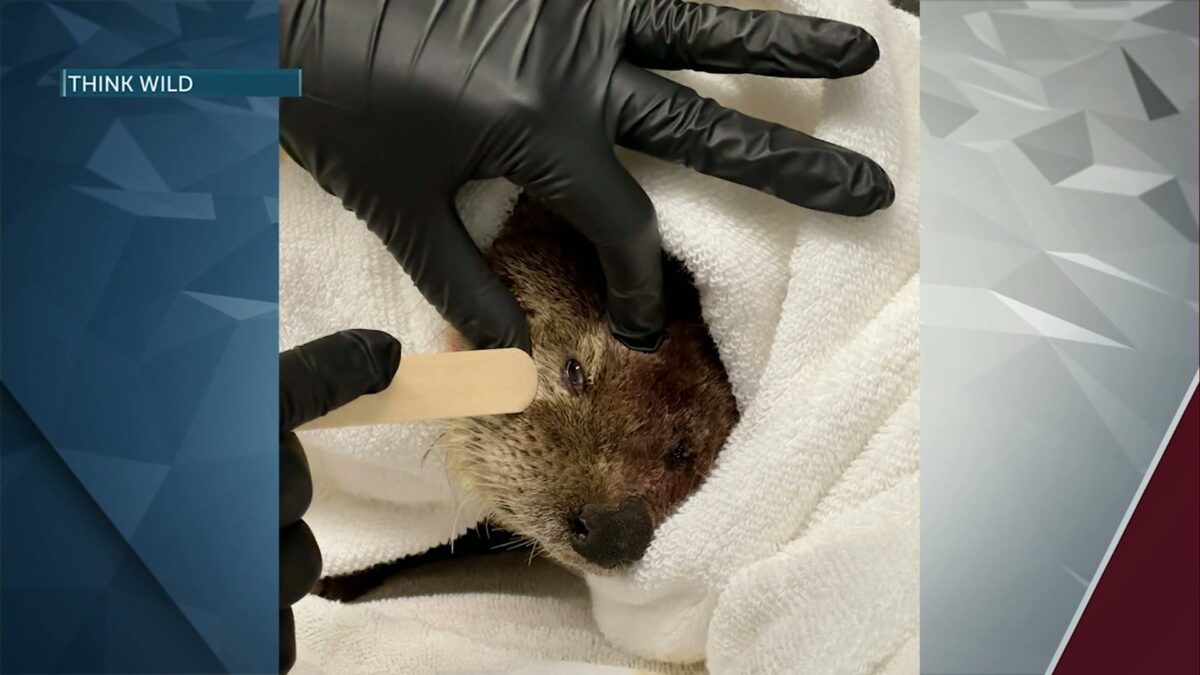Badly injured river otter rescued by deputy along Highway 97 passes away, despite intense efforts to save him

Triton Notary
(Update: Adding Video and comments from Think Wild)
BEND, Ore. (KTVZ) – A Deschutes County sheriff’s deputy rescued a badly injured river otter early Sunday morning after spotting the animal along Highway 97 near Tumalo Place. However, the otter later passed away, despite a wildlife hospital’s intensive efforts to save him, Think Wild Central Oregon said Tuesday.
Here’s an update posted Tuesday morning by Think Wild Central Oregon:
On May 25, a severely injured adult male river otter was found on the side of Highway 97 near Tumalo Place and Deschutes Junction, just north of Bend. The finder initially believed the otter was deceased but noticed slight movement and contacted authorities. The Deschutes County Sheriff’s Office transported the otter to Think Wild for emergency care.
Upon intake, the otter was unable to stand or walk and neurologically impaired, with significant trauma including head injury, eye damage, a broken tooth, respiratory distress, and dehydration.
Over the following two days, veterinary staff provided intensive treatment including fluids, pain relief, anti-inflammatory medication, and supportive care for possible traumatic brain injury (TBI) and internal trauma.
The otter showed mild signs of improvement, including intermittent alertness and the ability to lift his head and respond to stimuli. However, his condition remained critical, with continued neurological deficits, high fever, and elevated blood urea nitrogen levels indicating internal distress.
Despite best efforts and around-the-clock monitoring, the otter’s condition declined, and he passed away Monday night.
While river otters rely on rivers and wetlands, they often travel overland—sometimes miles—to find food or new habitat. The location where this otter was found is near irrigation canals and farmland, several miles from the Deschutes River and Tumalo Creek. Habitat fragmentation, human disturbance (especially during holiday weekends) and development often force wildlife to cross roads, putting them at risk of collisions and disorientation.
Sally Compton, Executive Director for Think Wild explained why the otter might have been in the area:“It’s not necessarily surprising that they would be found this far from water, especially during a holiday weekend where you might also see more people recreating in their habitat, enjoying the water and the creek. Maybe the otter could have been spooked or seeking a new shelter or habitat because of all of this human traffic.”
“So it’s not necessarily surprising that they would be found this far from water, especially during a holiday weekend where you might also see more people recreating in their habitat, enjoying the water and the creek. Maybe the otter could have been spooked or seeking a new shelter or habitat because of all of this human traffic.”
This incident highlights the need for wildlife crossings in Central Oregon. Structures like overpasses, culverts, and fencing can greatly reduce road fatalities and help species like otters safely navigate fragmented landscapes.
We are grateful to the finder, the Deschutes County Sheriff’s Office, and our veterinary team for doing everything possible to save this otter.
—
Earlier information:
Deputy Ochsner saw the otter around 6:06 a.m. and believed it had been struck by a vehicle, the sheriff’s office said in a statement. The deputy called for assistance, and responding personnel were able to safely crate the otter and transport it to the department’s Rescue Ranch facility.
Staff from Think Wild Wildlife Hospital and Conservation Center arrived shortly afterward and took the otter into their care. The otter’s current condition was not immediately available.
The sheriff’s office expressed gratitude for the quick response from both deputies and the Think Wild team and said they were hopeful for the otter’s recovery.